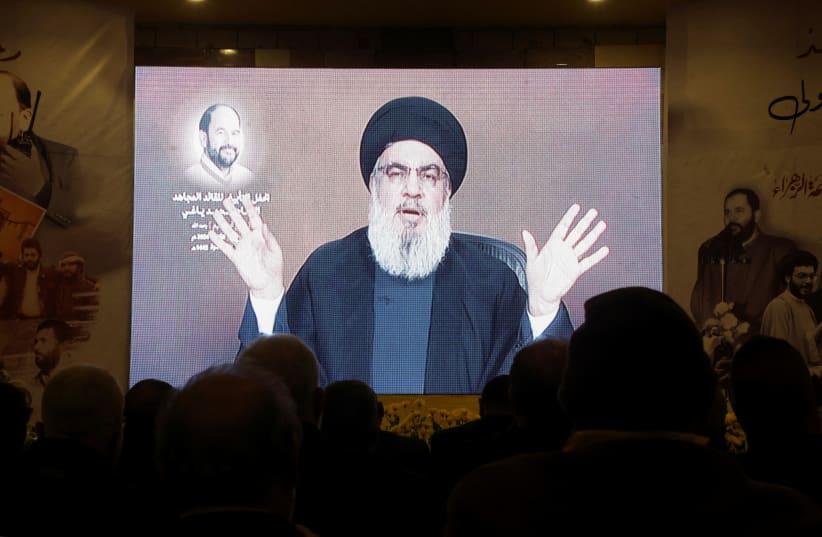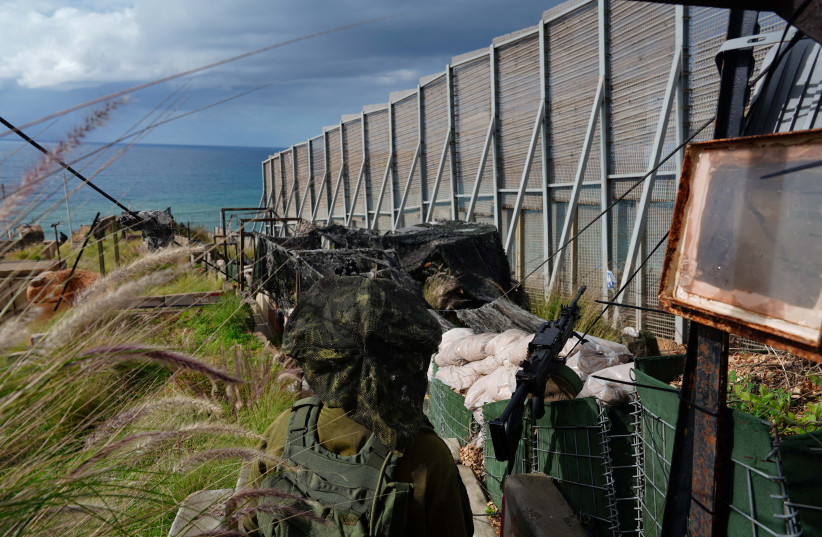There is now an understanding that in the post-October 7 realities that Israel must face, there is an imperative to deprive Iran of using its insurance policy as a shield.
JACOB NAGEL ANDREA STRICKER JANUARY 14, 2024 20:50

If the Islamic Republic of Iran decides to dash to a nuclear weapon, it will likely activate Tehran’s formidable insurance policy, the terrorist group Hezbollah, to open another front in Israel’s war and distract Jerusalem. This is the assessment of the Israeli government.
As the regime breaks out, Iran will almost certainly direct Hezbollah to assault Israel with some 150,000 to 200,000 rockets, missiles, drones, and projectiles it has stockpiled, many of them precision-guided-munitions (PGMs), all underwritten by Iran’s generous funding and technology transfers.
As of this writing, 50,000 to 100,000 Hezbollah terrorists are comfortably ensconced in southern Lebanon. Their forces have launched thousands of rockets, missiles, and drones at northern Israel since Hamas’ October 7th attack. Hezbollah’s goals: avert Israel’s focus on Gaza, drain precious military resources, and impose costs for Jerusalem’s decimation of Hamas, also a well-funded Iranian proxy.
Israel has evacuated its northern communities due to Hezbollah’s fire, with some 80,000 people now internally displaced. Hezbollah’s attacks are only becoming more brazen. Last week’s assault on a strategic Israeli air force base near Zefat is a case in point. Jerusalem’s patience is wearing thin.
Of course, Israel is currently focused on eliminating Hamas and its leaders in Gaza and bringing home all kidnapped civilians and soldiers. However, there is an understanding in Israel that sooner or later, the Israeli Defense Forces (IDF) must confront Hezbollah’s threat in Lebanon. Only after that has been accomplished, even partially, will the evacuated citizens be able to come back to their homes.

But this is not just about the residents of the north. There is now an understanding that in the post-October 7 realities that Israel must face, there is an imperative to deprive Iran of using its insurance policy as a shield to acquire the ultimate deterrent weapon.
Iran’s nuclear clock is ticking
Iran’s nuclear clock is ticking, and Israelis are keenly aware. Thankfully, although Tehran’s incentive and capacity to sprint to nuclear weapons increases daily, it still lacks enough enriched uranium to create a formidable nuclear arsenal. But according to the latest data reported by the International Atomic Energy Agency (IAEA), Iran is very close (weeks) to producing the nuclear fuel needed for up to 12 nuclear weapons. The regime will likely require an additional 18-24 months to weaponize the material for operational nuclear devices and mount them on delivery vehicles. However, once Tehran moves enough weapons-grade enriched uranium to a secret underground site, Israel (and perhaps the United States) would find it very difficult to act militarily and stop the effort.
The moment Israel responds to this is the moment that Hezbollah is likely to launch an all-out war. That is why a widening group of Israeli officials believe that they must act soon. Israel must degrade the Hezbollah breakout shield before the regime acquires enough enriched uranium and secretly perfects its ability to weaponize.
The timing is not ideal now for an Israeli preemptive strike against Hezbollah in Lebanon. Both sides are on full alert. America and France are warning both sides to stand down while they attempt to broker a political agreement that would lead to Hezbollah abiding by UN Security Council Resolution 1701 and move away from Israel’s border.
If an agreement can be reached whereby Hezbollah and its elite Radwan forces move north, limiting their capability to attack the Israeli villages with anti-tank missiles and constraining their ability to strike Israeli bases and towns, Jerusalem could postpone its immediate attack plans.
But make no mistake: Israel would still hone its plans for the near future. That future battle would include targeting Radwan forces and remaining bases and intelligence posts, near the Israeli northern border and deeper inside Lebanon. It would also include an assault on Hezbollah’s long-range PGM’s and production facilities, the command and control centers in Beirut, and the terror organization’s leaders.
The attack of October 7th taught Israel that it has no other choice but to confront Iran-backed terror threats, sooner or later. Israel can no longer allow terrorists to encircle it in a ring of fire.
Israel knows that it must also prevent Iran from obtaining nuclear weapons that would threaten Israel’s very existence. Because Hezbollah is the regime’s most powerful proxy, it is now seen as Tehran’s insurance policy during a breakout. After a breakout, the regime’s nuclear weapons would serve as an insurance policy for Hezbollah.
The Gaza war continues, and it is still Israel’s main concern and center. But another war beckons. Jerusalem must fulfill its commitment to protect its citizens. The IDF will soon have to act against Hezbollah. After that, there is an inevitable clash with Iran.
Brig. Gen. (res.) Jacob Nagel is a senior fellow at the Foundation for Defense of Democracies (FDD) and a professor at the Technion. He served as National Security Advisor to Prime Minister Netanyahu and as head of the National Security Council (acting). Andrea Stricker is a research fellow and deputy director of FDD’s nonproliferation and biodefense program. Follow her on X @StrickerNonpro. FDD is a nonpartisan research institute focusing on national security and foreign policy.
Content retrieved from: https://www.jpost.com/opinion/article-782163.